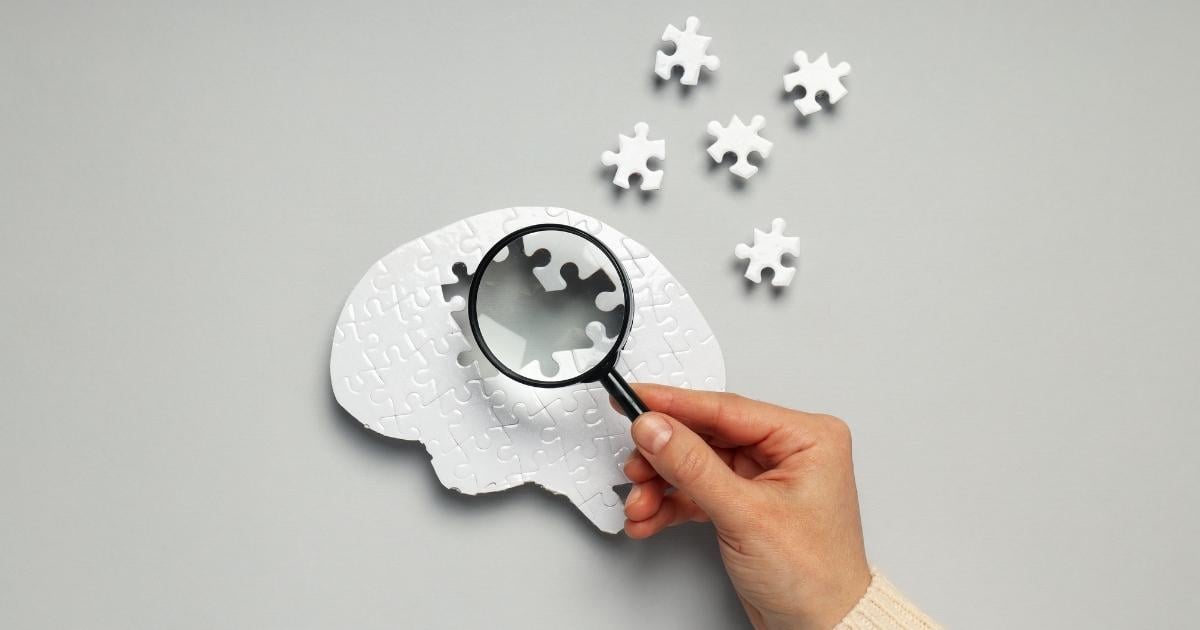This article was originally published via Aging.com
As we and our loved ones age, it’s reasonable to occasionally forget things—we all do it at some point. However, memory loss, defined as “unusual forgetfulness” in both short-term and long-term functions, is not.
Memory loss is often automatically associated with Alzheimer’s disease, a medical issue impacting over five million Americans yearly. Memory loss may be a primary symptom of Alzheimer’s. Still, just because an older person is experiencing memory loss does not mean they have the disease. Outside forces and other brain diseases often fuel the degrading of the brain’s cognition.
“The indications are that, in the absence of disorders due to trauma or neurological disease, the human brain can store almost unlimited amounts of information indefinitely,” one site dedicated to memory loss stated.
These outside forces can include trauma from a severe brain injury or a slow degrading of the brain’s ability to function due to drug abuse or diseases like Alzheimer’s. And they contribute to memory loss, and the brain can no longer store memories. These traumas and illnesses affect the brain’s ability to produce new brain cells, thus affecting its ability to create and recall memories.
But to understand what types of non-Alzheimer’s causes of memory loss are, we must first understand what Alzheimer’s is.

Alzheimer’s Disease
Alzheimer’s disease is the most common form of dementia. It’s worth noting that dementia isn’t a disease but rather an overarching way of describing memory loss due to age and various diseases. Between 60 and 80 percent of people with dementia have Alzheimer’s, and it’s believed the total number of seniors living with Alzheimer’s in the United States is over 5.5 million.
Alzheimer’s disease causes progressive degeneration of memory, cognitive, and motor functions, and it usually starts to develop around age 60. The more you age, the more at risk you are to develop the disease. “In Alzheimer’s disease, the brain cells degenerate and die, causing a steady decline in memory and mental function,” the Mayo Clinic said.
Some symptoms of the disease include:
- Declining memory: Not just the loss of short-term memory. Alzheimer’s can destroy all brain parts associated with remembering where you are in the present.
- Behavior change: Because Alzheimer’s is progressive, it can cause the diagnosed person to become depressed and withdrawn from society.
- Wandering: Someone with Alzheimer’s can often walk outside their home for no specific reason or recollection of how they got there.
- Impaired reasoning: Aside from memory, Alzheimer’s can affect how you think and your ability to handle abstract thoughts.
- Motor dysfunctions: People with Alzheimer’s have been found to lose their sense of touch along with other motor impairments, like being able to walk or use their hands.
There is no cure for Alzheimer’s at present. There are suggested treatments that may help quantify the effects of the disease, which is especially possible with an early diagnosis. The Alzheimer’s Association stated, “For nearly one in every four individuals who reported to a memory clinic with cognitive problems, their cognitive impairment was due to a reversible cause, such as depression or a vitamin B12 deficiency.” While this may not stop the degrading of motor functions, treating symptoms that contribute to memory loss can help seniors age with the disease somewhat more comfortably.
Other Forms Of Memory Loss
Alzheimer’s disease is not the only cause of memory loss in seniors. There are other diseases and outside forces that contribute to it.
Alcohol and Drug Abuse
Prolonged alcohol and drug abuse can have severely damaging effects on the brain.
“The brain is highly vulnerable to the neurotoxic effects of alcohol, and cognitive disorders may result from brain damage caused by chronic alcohol abuse,” a study linking alcohol use and cognition noted. It concluded that after looking at “longitudinal and brain imaging studies in the elderly … excessive alcohol consumption may increase the risk of cognitive dysfunction and dementia.”
Excessive alcohol use over a lifetime is also a primary cause for Wernicke–Korsakoff syndrome (WKS): “a short-lived and severe condition called Wernicke’s encephalopathy and a long-lasting and debilitating condition known as Korsakoff’s psychosis,” according to the National Institute on Alcohol Abuse and Alcoholism. The syndrome can cause older people to forget things in the short- and long-term. Patients with WKS can often discuss an event they experienced but may forget having that particular discussion shortly after that.
Drug abuse has similar effects on the brain.
Consistent drug use can lead to a multitude of injuries to the brain, like killing brain cells and seizures. It can also cause addiction, bringing myriad issues while changing brain functions.
Some drugs that can hinder the brain’s long-term cognitive ability include:
- Cocaine
- LSD
- Heroin
- Methamphetamines
- MDMA
- Opioids
Simply put, drug use directly affects how the brain can process memories.” A study noted that the brain regions and processes that underlie addiction overlap extensively with those involved in essential cognitive functions, including learning, memory, attention, reasoning, and impulse control.” The more someone uses drugs, the greater it affects their short-term and long-term cognitive abilities.
It’s never too late to get help, no matter how old you are. If you or a loved one needs assistance with alcohol or drug abuse (or related issues), seek an addiction specialist to assist in the beginning stages of recovery.

Depression
Depression is a severe issue with seniors; it can exist at any age and isn’t confined to any specific age group. Depression in seniors can be fueled by many factors, and they include:
- The loss of a spouse or friends
- Disassociation with the community/isolation
- Pain from physical issues
- Need for dependency when not accustomed to it
WebMD reports that only 10 percent of seniors who show symptoms of depression actually get treated for it. Depression can also severely affect elders’ health, being a leading factor for heart disease, and it’s often associated with seniors with conditions like cancer, Parkinson’s, and brain disease. It also affects elders’ memory.
“One of the ways that depression affects memory is by skewing the types of memories people tend to recall while in the grip of melancholy,” Memory Loss Online reported. For example, while grieving from the loss of a loved one, you may forget simple things such as an appointment because you’re instead focusing on the negative and sad memories.
Depression also impairs your ability to create long-term memories. “It really comes down to a lack of attention and concentration,” Constantine Lyketsos, MD, director of neuropsychiatry at the Johns Hopkins School of Medicine, told MLO.
There are ways to get help, though, and it’s never too late for therapeutic solutions. “Depression is treatable in 65 to 75 percent of elderly patients,” the American Academy of Family Physicians noted. How to help an older person varies per person, but AAFP recommends a blend of “medication and psychotherapy” with the guidance of a licensed professional. It’s been found, though, that medication that helps treat depression can sometimes cause problems with memory.
Other Forms Of Dementia
While Alzheimer’s may be the most common form of dementia, it is not the only form of dementia that contributes to memory loss and cognitive abilities.
Parkinson’s disease
Parkinson’s disease is one of the more common forms of dementia (after Alzheimer’s). The condition affects about one million people every year. It primarily leads to the loss of motor functions, as the Parkinson’s Disease Foundation pointed out, and they include:
- Tremors: Unintentional movements of muscles
- Unstable posture: Coordination and posture are impaired
- Slowness of movement: The symptom is called “bradykinesia” and causes someone with Parkinson’s to take much longer to complete simple physical tasks
- Stiffness: Affects the fluidity of muscles in the body.
Parkinson’s disease can cause cognitive impairments, too. “The same brain changes that lead to motor symptoms can also result in slow memory and thinking,” PDF says. These impairments are mild, but they affect the ability to remember simple actions and words that were once easy to recall and complete.
Huntington’s disease
Huntington’s disease is a fatal disorder typically inherited, affecting elders’ motor and cognitive functions. An average of three to seven in every 100,000 Americans have the disease. The Huntington’s Disease Society of America reported that about 30,000 Americans are symptomatic.
“Symptoms usually appear between the ages of 30 to 50 and worsen over a 10- to 25-year period,” the society said, noting that the disease can cause “forgetfulness and impaired judgment.” It’s also difficult for people with Huntington’s disease to retain or recall information from the past. Many of these memory loss impairments are fueled by depression associated with the disease.

Dementia with Lewy bodies
Dementia with Lewy bodies is the second most common type of progressive dementia after Alzheimer’s disease, according to the Mayo Clinic. It occurs when excessive amounts of proteins—known as Lewy bodies—develop on parts of the brain that affect motor skills and cognitive thinking. The disease is often associated with Parkinson’s disease because Lewy bodies often produce in the brains of those with Parkinson’s.
Memory loss often occurs later in the process with dementia with Lewy bodies (DLB) instead of being a primary symptom of the disease, like it is with Alzheimer’s, the Alzheimer’s Association noted. “Advanced DLB may cause memory problems in addition to its more typical effects on judgment, planning, and visual perception,” meaning DLB also causes hallucinations, which can affect the ability of elders to differentiate between what happened in the past.
Vascular dementia
Vascular dementia is caused by strokes. It is one of the most common forms of dementia in people over 65, MedlinePlus reported. The loss of blood flow to the brain caused by strokes kills brain cells, which is directly associated with memory loss.
It often co-exists with other cognitive-impairing dementias affecting elders’ short-term and long-term memory loss. “Problems with short-term memory typically show up first,” MLO noted. “[B]ut over time, the memory lapses become more severe, and dementia begins to take a debilitating toll on thinking, judgment, communication, and emotional stability.”
Medication Side Effects
Elders in America are one of the world’s most heavily medicated groups. Despite people aged 65 years or older only making up 13 percent of the U.S. population, they account for more than one-third of outpatient spending on prescription medications, according to DrugAbuse.gov.
In 2013 alone, the Center for Disease Control found that 2.8 billion drugs were “ordered or provided” by health professionals, and based on the report mentioned above, that means about 920 million of those drugs were intended for seniors. One site noted that “the average elderly patient is taking more than five prescription medications” and “the average nursing home patient is taking seven medications” at any given time.
This points out how often seniors use drugs, many of which have memory loss as a side effect. The American Association of Retired Persons (AARP) pointed out a bevy of general prescription drugs that can potentially cause memory loss. Some of those include medications for:
- Reducing cholesterol: While reducing cholesterol has been proven to help the heart and body, the drugs prescribed (statins) can also deplete the brain of cholesterol. The brain uses cholesterol as the “formation of connections between nerve cells — the links underlying memory and learning.” Some of these medications include Pravachol, Lipitor, and Lescol.
- Pain: Painkillers such as Percocet, Vicodin, and OxyContin affect pain receptors in the brain, causing pain levels to alleviate and the emotional response to pain to qualm. These types of drugs are called opiates and give the brain a sense of pleasure due to the relieved pain, which causes the brain to produce less of its own dopamine—the chemical that controls pleasure. If there is an overload of dopamine due to these drugs, there can be mild amnesia and even short-term blacking out. The more extended medications like this are used, the more they can affect short-term memory.
- Anxiety: Anti-anxiety medications (benzodiazepines) have been linked to memory loss because they weaken the brain’s ability to move short-term memories into long-term memory.
- Depression is common among elders, especially those who become isolated as they age and encounter more medical issues. The medication used to treat it, though, also often affects memory. “TCAs (Tricyclic antidepressants) are thought to cause memory problems by blocking the action of serotonin and norepinephrine — two of the brain’s key chemical messengers,” the AARP said.
Many of these medications are necessary, though, and help with the overall betterment of seniors as they age. Dr. Cara Tannenbaum, a professor of medicine at the University of Montreal, said that “despite the known risks, it may be better for some patients to continue their medication instead of having to live with intolerable symptoms.”
Choosing a healthy plant-based and vegan diet is most beneficial when it comes to:
-
Higher levels of energy;
-
Improved sleep;
-
Aids in energy and overall happiness;
-
Provides a sense of comfort and relief;
-
Could prevent major diseases such as obesity and diabetes;
-
Accomplish weight-loss and management; and
-
Improves mental and cognitive functioning.
There are really no excuses not to try healthier habits in your everyday life. If you are a man or woman looking for specific benefits of adopting healthier habits or just want to know about the general healing properties of herbs. Please remember to comment or post any health questions, or contact us directly!
Also feel free to share any of your favorite recipes to make and share it with the Assuaged community on our ➡️ Share A Recipe ⬅️ page!

















